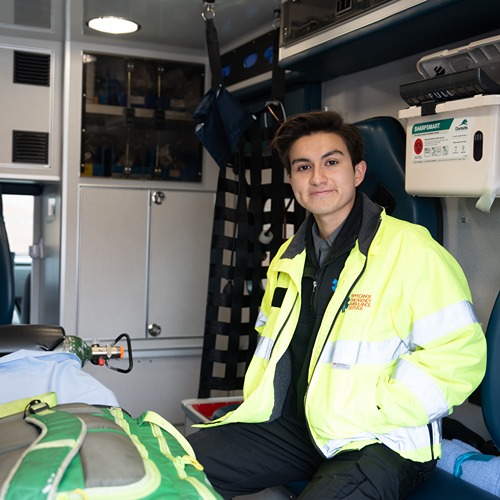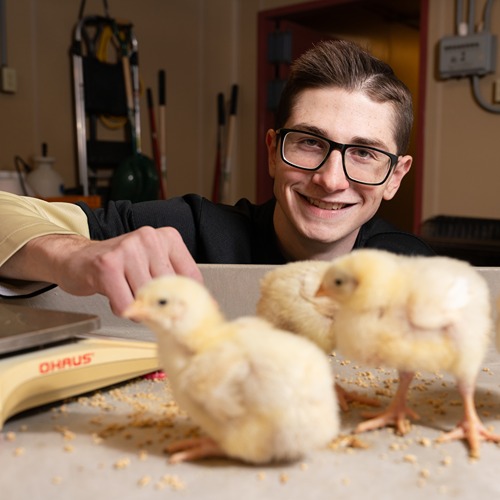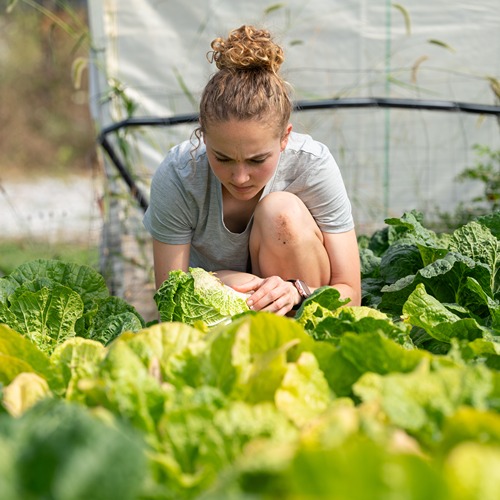Brent's Artwork Makes Impact on FNR Collections Lab
“I’m an artist, my medium just happens to be animals, not a pen and pencil or painting.” – Rachel Brent, senior wildlife major, FNR Collections Lab lead.
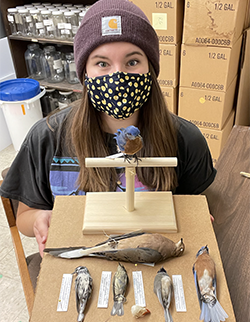 Rachel Brent has always been interested in nature. She enjoys going hiking and on backpacking trips and seeing things outside. Always curious, growing up she asked a lot of questions, wanting to find out what she was seeing and why it had its specific name. Her mother, Pamela, who works for the Indiana Department of Natural Resources, encouraged Rachel to study natural resources in college to satiate that hunger for knowledge.
Rachel Brent has always been interested in nature. She enjoys going hiking and on backpacking trips and seeing things outside. Always curious, growing up she asked a lot of questions, wanting to find out what she was seeing and why it had its specific name. Her mother, Pamela, who works for the Indiana Department of Natural Resources, encouraged Rachel to study natural resources in college to satiate that hunger for knowledge.
Google can only do so much for you,” Brent quipped. “It is really nice to be in the wildlife major, so I can put a name to what I’ve been seeing like trees and birds and plants and all of those sorts of things.
Once at Purdue, Brent began to expand her knowledge through several identification courses. First, she took Laboratory in Ecology and Systematics of Mammals and Birds (FNR 25250) taught by Cortney Mycroft, FNR Natural Resources Lab Coordinator and Collections Curator. Through that course, Brent was introduced to more than just the animals, encountering the FNR Collections Lab, something that would change the course of her college career and possibly beyond.
Brent’s inquisitive nature kicked in and she bombarded the Birds Lab teaching assistant with questions about how she could be a part of the Collections Lab. Time in Mycroft’s dendrology course the next semester led to her later becoming a TA for the course. In the meantime, Brent attended a few open houses for the specimen lab where she was able to work on preserving a bird and get to know the other members of the lab group. Brent told Rachel Brummet, then the lab lead, that she really wanted to get involved, prompting her to begin volunteering.
Rachel went through the standard process that we have for our collections lab where you go in and learn how to do it and volunteer for a bit to see if it is something that you’re interested in and good at,” Mycroft explained. “Then, after that, a student will progress into an employed position in the lab.
It soon became clear, however, that Brent was more than just interested in helping out in the lab. She wanted to go beyond the museum-quality specimens which most students work on in the Collections Lab. Brent, Brummet, and Mycroft took a taxidermy class online taught by world-renowned taxidermist Allis Markham and Brent was all in.
Allis is amazing; I strive to be like her, her quality of work is amazing,” Brent said. “I took that class and I was hooked. I bought all of the supplies myself to do it at home. I took Allis’s first class and then I saw she had more classes, so I just kept taking them.
Brent started with a Birds in Flight course, then a diorama class for museum-quality specimens, and a basic taxidermy class as well.
Brent began teaching herself through Markham’s videos and soon was able to use that knowledge to not only add specimens like an eastern bluebird and a male cardinal to the Purdue FNR collection but also to repair existing ones. This summer Brent was promoted to Collections Lab lead, a role in which she has made herself invaluable to Mycroft.
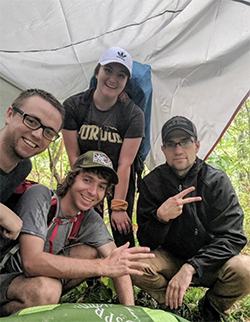 I’ve had several lab leads throughout the years, but with each iteration I’ve had students that have improved the process or been better trained and Rachel has gone above and beyond that,” Mycroft said. “Instead of just doing museum specimens, which are stored in drawers, she has learned how to do taxidermy, which are the live-looking mounts. In addition to that, she’s figured out how to mend some of the old pieces from our collection that are historic, that I otherwise wouldn’t be able to use to help teach students. She has not only improved and maintained the collection we currently have, but also helped add to it.
I’ve had several lab leads throughout the years, but with each iteration I’ve had students that have improved the process or been better trained and Rachel has gone above and beyond that,” Mycroft said. “Instead of just doing museum specimens, which are stored in drawers, she has learned how to do taxidermy, which are the live-looking mounts. In addition to that, she’s figured out how to mend some of the old pieces from our collection that are historic, that I otherwise wouldn’t be able to use to help teach students. She has not only improved and maintained the collection we currently have, but also helped add to it.
She has been an assistant in all aspects of my position, but she is definitely my go-to person when it comes to anything with the collections. She’s the one that is in charge and the one I lean on for things.”
Whatever Brent is working on in the lab, she realizes it is an opportunity to educate those around her about the impact the work she is doing can have across disciplines.
It’s something that people don’t really know about and often times they are kind of freaked out, so anytime someone walks past my lab and lingers, I try to explain what I am doing and let them know that these specimens can be used for research, they can be used for science and natural history and even museums,” Brent said. “I want to educate people on this side of natural history and forestry and natural resources because it’s really important. Things go extinct on a daily basis and we have to preserve those somehow.”
Just like with any art medium, cleaning, maintenance, and repair of specimens is vital to ensuring they are around for future generations to learn from and appreciate.
We have a teaching collection, so our specimens are all hands-on,” Brent explained. “We have a lot of specimens that come from various parts of the world and we might not ever get these types of specimens again. A lot of them are so old and they’ve been handled so often they are falling apart, so I have been practicing a lot of different techniques to properly repair them. Somebody worked really hard to put them together for a scientific purpose, and they still serve a natural history purpose.”
Brent’s appreciation of various species is not limited to the work she does in the lab. She is actively seeking outdoor interactions as well.
I love animals, that’s why I do what I do,” Brent explains. “I go birding a lot. I go on backpacking trips and go wildlife watching. Those sorts of things are how I ground myself. I don’t like staying in the lab all day, because you get so hyper-focused. You need to get out and experience nature. I have a dog, so I go to the dog park with him. I also have a cat and almost 100 houseplants that I take care of. I try to stay close to nature a lot and bring it into my space.”
Brent has been a part of the Purdue Student Chapter of The Wildlife Society since 2019. She has acted as the teaching assistant for Mycroft’s dendrology class (FNR 22500) as well as the vertebrates lab (FNR 25250). She also was a TA at Summer Practicum.
In the field, she has participated in bird banding with Dr. Barny Dunning’s lab and also worked with the Purdue Northern Saw-Whet Owl Banding Station.
All of my major professors – Dr. (Elizabeth) Flaherty, Dr. Dunning, Dr. (Pat) Zollner, and Cortney (Mycroft) – have been super influential,” Brent noted. “They are so passionate about what they do and I want to be as passionate about what I do as they are about what they do. They are the crowd of people who I see the most often and who I can relate to a lot as well.
Brent’s passion for and dedication to preserving the past and carrying on the life of the specimens she works with is just one way that she is impacting the future of Purdue Forestry and Natural Resources. She also is setting an example for future students of what is possible.
Someday someone is going to come in and be wowed like I was looking at all of the beautiful specimens and think this is really cool,” Brent shared. “I think it can be really inspiring to people who want to do this or who have thought about doing it because normally when you think of a taxidermist, you think of a burly dude who is just working on deer or other wild game. I don’t look like a typical taxidermist or a person who would want to do this sort of work, so I think that can be really inspiring to people like me.”
She also sees the possibilities that the Collections Lab can provide to various cohorts on campus.
“A lot of people don’t realize that our collection exists,” Brent said. “I want to make our collection known, to let people know to donate their stuff to us because we do great things, but also for everybody to know that we do it, just in case someone’s interested in studying or could use our specimens for research or art or whatever.”
Brent, a senior wildlife major, hopes to continue working in taxidermy after her graduation in December 2021. She sees opportunities to work in a lot of areas from museums to nature centers, with other universities, or even in her own studio, and is open to whatever may come her way, but you can bet that nature will be a big part of whatever job she occupies.
“My major goal would be having my own little studio and then people can contract my workout,” Brent said. “I would also like to use education to promote this sort of thing because we have all of the resources to educate people and when it is possible to do that again, we don’t have to bring live animals, which can be ethically and morally challenging. I don’t know anybody in Indiana who does this sort of thing. There is a hole that needs to be filled in Indiana and I would love to fill that hole. That way if anyone, even universities, need work done and they don’t have the person to do it, they can send it to me.




